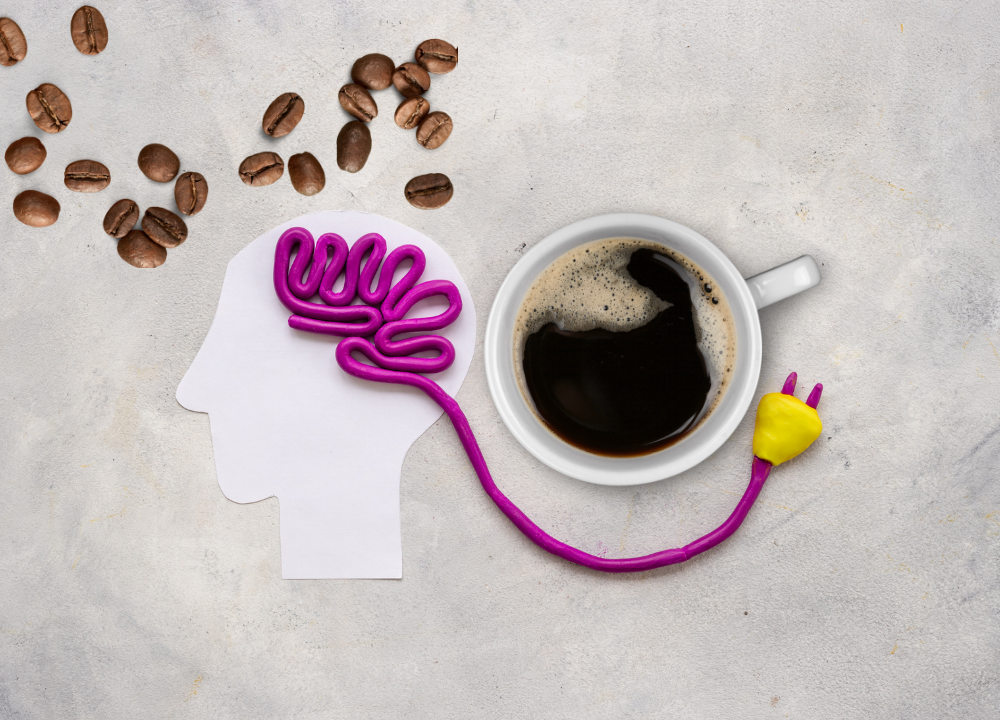Coffee is a popular drink. It wakes us up and keeps us alert. But does it really make our brains work better? This question has sparked many ideas and myths. Some say coffee helps with memory and focus. Others think it might harm our health.
Introduction To Coffee And Brain Function
In this guide, we will explore how coffee affects the brain. We will debunk common myths and reveal the truth about coffee and mental performance.
Why Coffee Is Linked To Mental Performance
Coffee is a popular drink worldwide. Many people rely on it to start their day. But why is coffee so closely linked to mental performance? Here are some key points:
- Caffeine Content: Coffee contains caffeine. This is a natural stimulant.
- Improved Focus: Caffeine can help increase alertness.
- Enhanced Mood: Drinking coffee can make people feel happier.
Studies show that coffee drinkers often perform better on tasks requiring attention and memory. Here is a table summarizing the benefits of coffee for mental performance:
| Benefit | Description |
|---|---|
| Increased Alertness | Caffeine blocks adenosine, a brain chemical that makes you sleepy. |
| Better Mood | Caffeine can increase dopamine levels, improving mood. |
| Improved Memory | Caffeine may enhance short-term memory and learning. |
Many people find coffee helps them concentrate. It can be a useful tool for those needing a mental boost.
The Science Behind Coffee’s Effects On The Brain
Understanding how coffee affects the brain requires looking at the science behind it. Caffeine, the main ingredient in coffee, impacts brain function in various ways:
- Stimulates the Central Nervous System: Caffeine helps increase heart rate and energy levels.
- Blocks Adenosine Receptors: This action keeps you awake and alert.
- Releases Neurotransmitters: Caffeine boosts dopamine and norepinephrine, enhancing mood and focus.
Research indicates that moderate coffee consumption can improve cognitive function. Here are some findings:
- Studies suggest that coffee drinkers have a lower risk of cognitive decline.
- Regular coffee consumption may protect against Alzheimer’s disease.
- Caffeine may enhance reaction time and mental agility.
While coffee can be beneficial, moderation is key. Too much caffeine can lead to anxiety or jitteriness. Understanding your limits can help you enjoy the benefits without negative effects.
How Coffee Affects Brain Function
Understanding how coffee affects brain function can help clear the air. Let’s dive into how it really works.
Caffeine And Its Role In Alertness
Caffeine is the main ingredient in coffee that helps us feel awake and alert. It blocks a brain chemical called adenosine. Adenosine makes us feel tired. When caffeine blocks it, we feel more energetic.
Here are some effects of caffeine on alertness:
- Increases energy levels.
- Improves reaction time.
- Enhances mood.
Many studies show that caffeine can boost mental performance. It is especially helpful during tasks that require concentration. Below is a table showing average caffeine content in popular drinks:
| Drink | Caffeine Content (mg) |
|---|---|
| 8 oz Coffee | 95 |
| 8 oz Tea | 47 |
| 12 oz Cola | 34 |
| Energy Drink (8 oz) | 80 |
Moderate caffeine intake can improve focus and alertness. However, excessive caffeine can cause jitters or anxiety. Balance is key.
Coffee’s Impact On Memory And Focus
Coffee does more than just wake us up. It can also improve memory and focus. Research shows that caffeine enhances short-term memory. This helps with learning and recalling information.
Here are ways coffee affects memory and focus:
- Boosts attention span.
- Enhances cognitive performance.
- Improves long-term memory.
A study found that participants who consumed caffeine performed better in memory tests. Caffeine can also help with problem-solving tasks. Here’s a quick list of benefits:
- Better concentration.
- Faster processing of information.
- Improved decision-making skills.
Drinking coffee in moderation can lead to better focus. It is helpful for students and professionals alike. But, too much coffee can lead to headaches or trouble sleeping.
The Role Of Antioxidants In Brain Health
Coffee is rich in antioxidants. These are substances that protect our cells from damage. Antioxidants play a key role in brain health. They help reduce inflammation and can protect against diseases.
Here are some key antioxidants found in coffee:
- Caffeic acid
- Chlorogenic acid
- Melanoidins
Research suggests that these antioxidants may help lower the risk of neurodegenerative diseases like Alzheimer’s. Here’s how antioxidants benefit the brain:
| Benefit | Description |
|---|---|
| Reduces inflammation | Helps with overall brain health. |
| Protects neurons | Prevents damage to brain cells. |
| May enhance mood | Improves mental well-being. |
Including coffee in your diet can be a good source of antioxidants. It is a simple way to support brain health.

The Myths About Coffee And Cognitive Power
Many people believe coffee boosts brain power. This idea leads to myths about its effects on cognitive abilities. Understanding these myths is essential.
Does Coffee Really Make You Smarter?
Coffee is often seen as a brain booster. But does it truly make you smarter? Research shows that coffee can improve focus and alertness. It can help you stay awake and feel energetic. However, this does not mean it increases intelligence.
Some studies suggest coffee may enhance certain cognitive functions:
- Improved attention span
- Better reaction times
- Enhanced mood
But these effects are temporary. They do not lead to long-term intelligence gains. A study found that caffeine can help with tasks requiring quick thinking. Yet, this does not mean it makes you smarter overall.
| Effect | Duration | Impact on Intelligence |
|---|---|---|
| Increased Alertness | Short-term | No |
| Improved Focus | Short-term | No |
| Enhanced Mood | Short-term | No |
In summary, coffee can help you feel more awake and focused. It does not make you smarter. Use it wisely for short bursts of energy.
Can Coffee Replace Sleep For Mental Clarity?
Many people think coffee can replace sleep. After a sleepless night, a cup of coffee seems like a quick fix. But can it really help? Caffeine can mask tiredness. It may help you feel more alert temporarily. Still, it does not replace the need for sleep.
Here are some important points:
- Caffeine blocks adenosine, a chemical that makes you sleepy.
- This gives a short-term energy boost.
- Long-term caffeine use can lead to dependence.
Without enough sleep, cognitive functions suffer:
- Poor decision-making
- Reduced memory retention
- Lower creativity
In essence, while coffee can help you stay awake, it cannot replace sleep. Prioritize sleep for optimal brain health.
The Misconception About Unlimited Coffee Benefits
Many believe coffee has endless benefits for the brain. This misconception can lead to overconsumption. While moderate coffee intake is safe, too much caffeine can cause problems. It can lead to anxiety, jitters, and sleep issues.
Consider these potential side effects:
- Increased heart rate
- Digestive problems
- Dependency on caffeine
Research suggests that 3 to 4 cups of coffee a day is safe for most adults. Consuming more can be harmful. Understanding your limits is essential.
| Coffee Consumption | Recommended Amount | Possible Side Effects |
|---|---|---|
| Moderate | 3-4 cups | None |
| High | 5+ cups | Anxiety, insomnia, jitteriness |
In conclusion, coffee has benefits. These benefits are not unlimited. Consume it wisely for better brain health.
The Truth About Coffee’s Limitations
The truth is, coffee has limitations. Understanding these limits helps people use coffee wisely. It’s important to know when coffee can help and when it can hurt.
When Too Much Coffee Backfires
Drinking too much coffee can lead to negative effects. While a small amount can enhance alertness, excess caffeine can cause problems.
- Anxiety: High caffeine intake can increase feelings of anxiety.
- Insomnia: Too much coffee can disturb sleep patterns.
- Heart Rate: It may cause an increased heart rate.
- Stomach Issues: Excess caffeine can lead to stomach upset.
People often overlook these side effects. They might think they need more coffee to stay focused. In reality, too much coffee can hurt concentration.
Here’s a simple table showing the recommended daily caffeine limits:
| Age Group | Recommended Caffeine Limit (mg) |
|---|---|
| Adults | 400 |
| Pregnant Women | 200 |
| Teens | 100 |
| Children | None recommended |
Listening to your body is key. If you feel jittery or anxious, consider cutting back.
Tolerance And Dependency: A Double-edged Sword
Caffeine tolerance can build over time. Regular coffee drinkers may find they need more to feel the same effects. This can lead to dependency.
Signs of caffeine dependency include:
- Needing coffee to start the day
- Feeling headaches without it
- Increased cravings for caffeine
People often increase their intake to combat these symptoms. This creates a cycle that’s hard to break. Reducing caffeine can lead to withdrawal symptoms like:
- Fatigue
- Irritability
- Difficulty concentrating
Understanding this cycle is important. Moderation is vital to avoid dependency. Being aware of how much caffeine you consume can help maintain a healthy balance.
Individual Differences In Caffeine Sensitivity
Caffeine affects everyone differently. Some people feel energized after one cup. Others may feel jittery or anxious. Genetics plays a key role in this sensitivity.
Factors that influence caffeine sensitivity include:
- Genetics: Some people metabolize caffeine faster than others.
- Age: Sensitivity can change with age.
- Health Conditions: Certain conditions may increase sensitivity.
A study found that about 50% of people are slow metabolizers. They may experience more side effects from the same caffeine dose.
Listening to your body is essential. If caffeine makes you feel uncomfortable, consider reducing your intake. Everyone’s body is different. What works for one person may not work for another.

